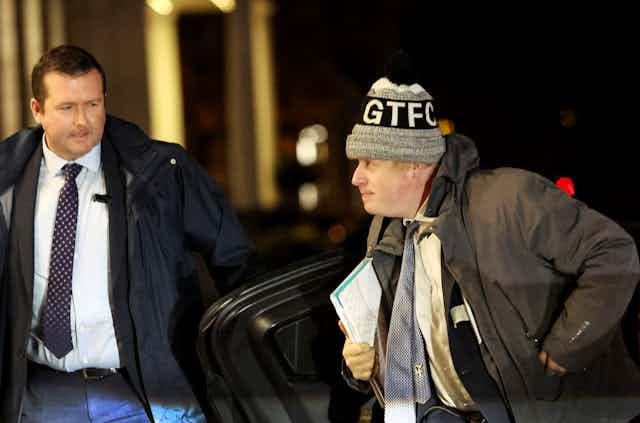Boris Johnson has lost his bounce. As he gave evidence before the COVID inquiry, his body language arguably said far more than the often rambling statements that came out of his mouth.
Slumped in terms of physicality, slow in terms of intellectual responsiveness and sullen in terms of attitude, he was still unable to provide a clear explanation of how and why critical decisions were taken during the pandemic.
Looking like a schoolboy who had been called into his headmaster’s office, Johnson opened his testimony by offering an apology. He had failed to realise that COVID would be an “utter disaster” for Britain.
He was sorry for bereaved families and their “pain, loss and suffering”. The former prime minister said he would “struggle to itemise” his mistakes but insisted his government did its “best in very difficult circumstances”.
But how do we make sense of Johnson? And how does the COVID inquiry connect with this question?
The parameters and pathologies of Johnson’s personality are relatively well known by now. His assent to the leadership of the Conservative party and ultimately to the premiership was based upon a heady combination of celebrity status, charisma and charm. His willingness to play fast and loose with the truth no doubt also played a part.
Attention to detail, serious reflection, stability (in either professional or personal dynamics) were never part of his skillset. He was a gambler, or as his former director of communications put it, he was the “wrong prime minister at the wrong time”.
It’s therefore no surprise that Johnson’s biggest single mistake was simply failing to grasp the scale of the crisis.
But the primary aim of the COVID inquiry is to learn, not to blame. Learning not to appoint individuals who are clearly incompetent to the position of prime minister may well be too political a conclusion for the inquiry to come to but it will undoubtedly lurk between every line and every page of the final report: as unwritten as it is obvious.
And yet there are far wider repercussions that must be acknowledged. As a seam of scholarship attests, public inquiries are also tasked with fulfilling a more cathartic or healing role.
While this is most obvious in relation to “truth and reconciliation” commissions it is also a key component of more traditional statutory public inquiries. The COVID inquiry has embraced and innovated in this regard through its Every Story Matters initiative, which invites members of the public to share their thoughts and experiences in order to inform the inquiry’s work and recommendations.
Learning, not lynching alongside broader societal sensemaking therefore form the twin ambitions of the inquiry.
Read more: COVID inquiry: how it works, and when we will know if it is successful
Fuelling an anti-political backlash
Among the apologies and angst there is a deeper danger lurking around the inquiry. How are the public to make sense of the evidence that the inquiry is collecting – the passing of bucks, the ducking of responsibility, the strategic scapegoating, the blunders of our government – in terms of preparation or performance?
The behaviour of the people who have given evidence so far – from advisers to ministers to the former prime minister himself – runs the very real risk of further fuelling of anti-political sentiment. This is a wider democratic dimension that has so far escaped discussion.

Sensemaking processes can be both positive and negative, critical and constructive. As research has revealed, on some occasions public inquiries can play a role in taming anger and helping healing.
But dealing with an angry public is far from easy, and inquiries can on occasion backfire if their conclusions are interpreted by the public as failing to make sense. This explains the link between public inquiries and long-standing accusations of blame-avoidance and whitewashing.
The contextual risk of the COVID inquiry is that it could exacerbate a pre-existing and apparently growing pool of anti-political sentiment. Levels of public trust in politicians, political processes and political institutions have been shown by a number of studies to correlate with effective societal responses. People don’t comply if they don’t trust their political leaders.
So as the world focuses on the nuances of Johnson’s evidence to the COVID inquiry and seeks to deconstruct the discourses deployed and the performative tricks, they risk overlooking wider and more future-focused issues. What if the results of the inquiry add to the pre-existing sense amongst large sections of the public that politicians are incompetent, in it for themselves and not to be trusted?
Instead of promoting social healing what if the inquiry’s findings are interpreted as underlining a stronger sense of “them and us” which fuels anti-political sentiment? What might the implications of this be for the next general election and the chances of new “insurgent” parties?
Making sense of Boris Johnson is actually very easy. Making sense of COVID and its implications for apologies, angst and anti-politics is far more complicated.

